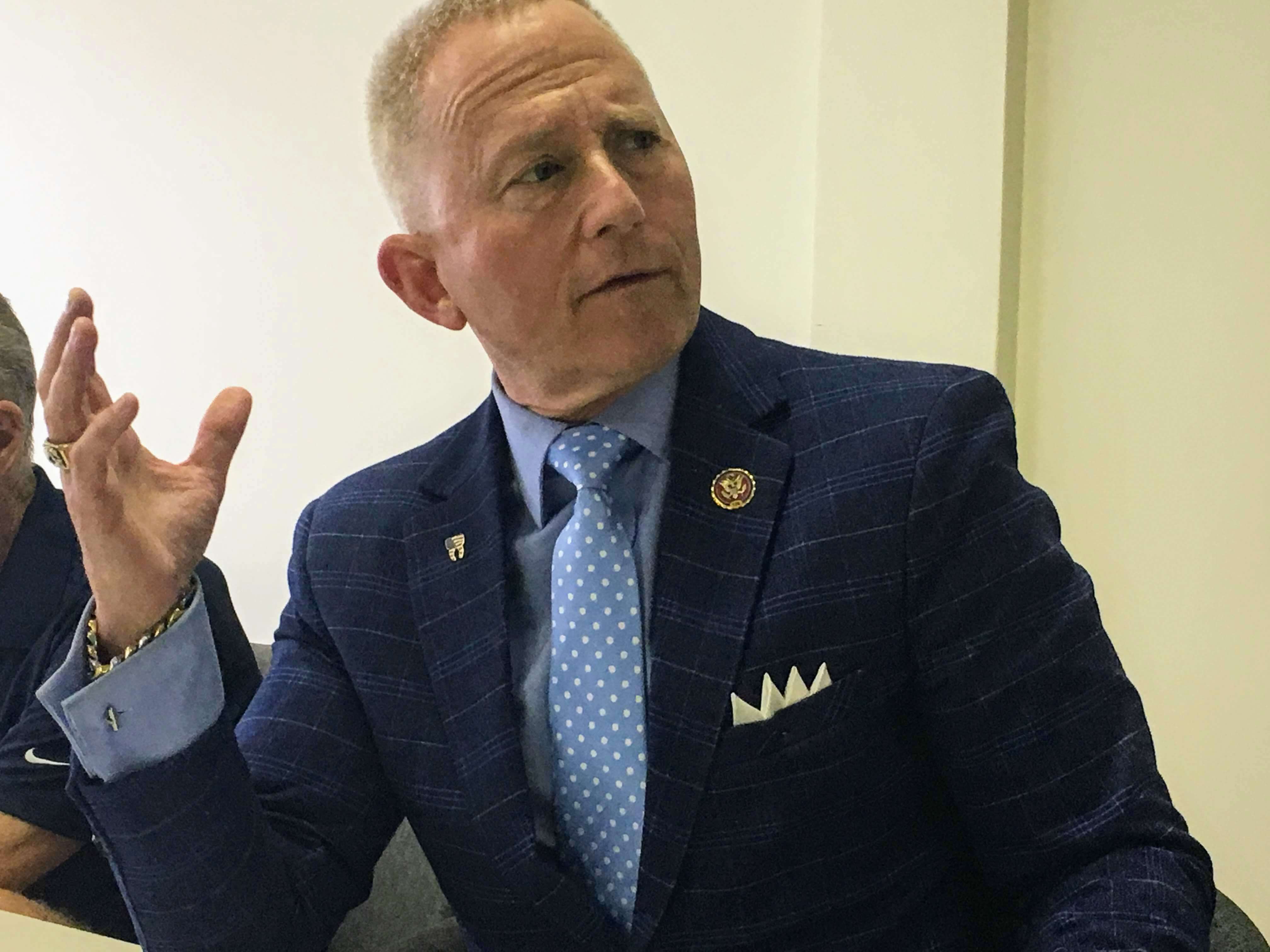COURT HOUSE – Retired Cape May County prosecutor Robert Taylor filed a “Whistleblower” civil suit Nov. 20 against the freeholders, Freeholder Director Gerald Thornton and Human Resources Director Jeffrey Lindsay.
Taylor, prosecutor from Oct. 1, 2004, to Oct. 1, 2017, demands a jury trial for his three-count suit.
Taylor told the Herald he had 34 years with the Prosecutor’s Office, which included service as a municipal judge and municipal prosecutor before serving as the county’s top appointed law enforcement officer.
Taylor said calculation of that time is provided under legislation signed by the governor.
For those years, Taylor seeks health benefits which, he said, were promised to him as they had been to previous individuals who held the office.
Taylor believes those benefits are being withheld, in part, due to his actions which centered around the Assistant Prosecutors’ bargaining units negotiations with the county. At the time, the protracted talks became bitter, and he was urged to fire the lead negotiator from his office, which he refused to do.
Additionally, Taylor said he annually provided freeholders with data to document the severity of the illegal drug problem in the county, but that the board instead continued to release outdated figures to the public.
To that end, Taylor maintains the board did not provide requested additional manpower needed by his office to staff the narcotics task force, a charge refuted by the board.
County Statement
In a Nov. 22 statement from the Office of County Counsel: “…Taylor has filed a baseless and frivolous lawsuit in a transparent attempt to secure for himself and his spouse special, lifetime privileges to which he is simply not entitled under clear New Jersey law.
“Simply stated, Mr. Taylor does not have the required length of service in qualifying positions to add to his tenure as County Prosecutor. As a consequence, he is not entitled to post-retirement benefits at the taxpayers’ expense as a matter of law.
“This has been explained to him on numerous occasions, and in both verbal and written form, in the several months before his retirement. When presented with the plain fact that he was legally ineligible for the special benefits he sought, Mr. Taylor responded by threatening to file this baseless and frivolous lawsuit.
“In his complaint, Mr. Taylor has also blatantly misrepresented the history of cooperation that has existed between the County Prosecutor’s Office and the Freeholder Board.
“The Freeholder Board has a demonstrated history of supporting the Cape May County Prosecutor’s Office while maintaining fiscal discipline.
“Reasonable requests for manpower, resources, and equipment were granted whenever possible, within the confines of the county budget.
“During Mr. Taylor’s tenure, the county increased Prosecutor’s Office funding from $2,771,921 to $7,109,007, and increased staffing from 56 to 88.
“As recently as this year, the Prosecutor’s Office was authorized to hire two additional investigators specifically to address the opioid epidemic. In a feeble attempt to support is baseless accusations and secure lifetime taxpayer-funded health benefits, Mr. Taylor has even gone so far as to take advantage of the opioid epidemic to mask his selfish attempt to claim taxpayer-funded retirement benefits.
“It is disappointing but predictable that Mr. Taylor has chosen to attempt to try to bully his way with frivolous and untruthful personal and political accusations, to a benefit he is statutorily ineligible to receive.
“The county is eager to aggressively defend these false and spurious allegations and will be seeking from Mr. Taylor reimbursement for all fees and costs associated with this baseless and frivolous complaint.”
Taylor’s Reply
The following is Taylor’s reply to the county’s statement:
“I have over 34 years in the Prosecutor’s Part Pension; others were given health benefits with about 25 years in the Prosecutor’s Part.
“The freeholder board falsely claims supporting the Prosecutor’s Office and a history of cooperation with the Prosecutor’s Office under Prosecutor Taylor’s tenure; that is not true.
“I had to sue the freeholder board in 2006 to get minimal staffing and resources in a Bigley lawsuit. A court order required the freeholders to increase staffing to the bare minimum and give more resources. The claim of support by the freeholders of the Prosecutor’s Office is blatantly false.
“If not for the court order, the funding would not have increased. The court recognized a large increase was needed because of under funding of the Prosecutor’s Office for years by the freeholders.
“Again, the freeholders have misrepresented the facts. The two additional investigators were replacements, they were not additional investigators as claimed to specifically address the opioid epidemic.
“The number of investigators/detectives has not been increased by the freeholders since 2006. The Feb. 26, 2008 court order set the staffing level for detectives and investigators at 42. Despite repeated requests for more investigators due to significant increase in the heroin epidemic and drug dealing in the county, the freeholders did not approve one additional investigator.”
Taylor Alleges:
Count One
* In 2016-2017 when the Assistant Prosecutors’ Association, a bargaining unit for attorneys working in the Prosecutor’s Office, was in protracted negotiations with the county, its union leader, and the “primary negotiator” for the county, Lindsay, talks became “heated and contentious.”
The union’s “use of OPRA requests seeking personal information relating to…Lindsay…that might prove embarrassing to him”…”reached such a fevered pitch” that Taylor “took multiple telephone conferences and multiple face-to-face meetings with…Thornton…on the topic…” between 2016 and 2017.
Taylor stated Thornton and Lindsay “individually voiced their displeasure with the union leader, each intimated that negotiations would go smoother without her participation and implicitly and explicitly suggested that…Taylor and the Prosecutor’s Office would be better served if he cut ties with the union leader and terminated her employment with the…Prosecutor’s Office.”
Meanwhile, Taylor refused to follow that course of action.
The union leader was, at the time, thought to be a possible successor to Taylor upon his retirement.
When Taylor would not terminate the union leader, “…Lindsay…during a one-on-one meeting with…Taylor said he would do what he could to make sure that said union leader did not succeed” Taylor as the prosecutor.
At the same meeting, Taylor stated, Lindsay, “referred to (the union leader) as a ‘troublemaker.'” Lindsay also referred to the union leader “…in disparaging gender-specific terms.”
The union and county reached an accord but “the targeting of the union’s leader by…Thornton…and Lindsay continued.”
In “July or August 2017, when the leader of the union was under consideration for a judgeship to the Superior Court of New Jersey…(freeholders) authorized the issuance of a letter and internal affairs complaint against the same union leader.”
Normally, Taylor would have filed such a complaint. Instead, the board “bypassed those protocols and filed their letter and complaint directly with the (state) Attorney General’s Office…due in part, to the previous objections of…Taylor and his refusal to participate in the concerted effort of…Thornton…and…Lindsay to remove the union leader from not only her leadership position within the union but also from employment” with the County Prosecutor’s Office.
Taylor stated the Attorney General’s Office “almost instantaneously…recognized the letter and internal affairs complaint of defendants…for the subterfuge it was and remanded the matter back to” Taylor.
With that action, Taylor “began receiving implicit/implied pressure from defendants…to sustain the allegations, discipline the leader of the union, and derail her possible judgeship.”
Taylor then assigned the matter to his senior prosecutor for investigation.
“Said investigation resulted in the charges being totally unfounded, and the union leader was eventually cleared to sit on the Superior Court of the State…”
After that, Taylor claimed the defendants, “continued to maliciously target” him and his office “for his non-participation in the attempt to remove the union leader from not only her leadership position within the union but also from employment with the…Prosecutor’s Office.”
Count Two
Taylor noted the drug epidemic in the county including heroin, fentanyl and opioids, and his “leadership…to prioritize funding of the…Prosecutor’s Office towards fighting said epidemic and sought additional funding to aid in the fight.”
He cites the state’s bail reform as a “competing interest” with the opioid epidemic under budgetary constraints.
Taylor said that, after the media became interested in the drug problem in 2016 and 2017, and requests for interviews with him and the freeholder board he “discovered that members of…freeholders were using and utilizing stale, outdated, inaccurate, and incorrect data when communicating with the media and public concerning the epidemic fueled by heroin, artificial heroin, fentanyl, and opioids in Cape May County.
“Accurate information was readily available from…Taylor of his office, but no freeholder asked for said accurate and updated information.
“Said stale, outdated, inaccurate, and incorrect data portrayed the epidemic…as less severe than it really was and under reported the nature and extent of the problem.”
Taylor, on bringing that to the board’s attention “…was implicitly and explicitly encouraged to disregard the actual data and to embrace the stale, outdated, inaccurate, and incorrect data concerning the epidemic…so as to directly portray to the media and indirectly portray to the citizens of Cape May County a false sense of control over said epidemic.”
Taylor stated he “rebuffed the encouragement to disregard the actual data and voiced his intention to release the actual data to the media.”
He continued that the board “implied that such a move…would have negative consequences on his efforts to seek additional funding for (his office) to fight the epidemic.”
He said the “ultimatum issued” by the board was a “Hobson’s choice” (Basically, take it or leave it.)
Because of the preceding, Taylor believes the board’s actions caused him to suffer “both economic and non-economic damages and has otherwise been irreparably injured.”
Count Three
The third and final count alleges the county was “deliberately indifferent to the constitutional rights” of Taylor in that it failed to “equip them with specific tools necessary to handle recurring and predictable situations such as the one involving” him.
He stated that the board’s failure to “adequately screen and/or train its elected officials and/or employees” caused him to be damaged, and were in violation of his civil rights.
He seeks compensatory damages, punitive damages, attorney’s fees and litigation costs and any other relief the court “may deem equitable and just.”








